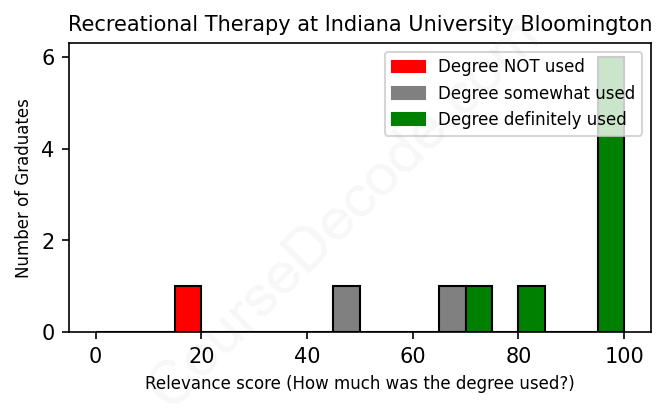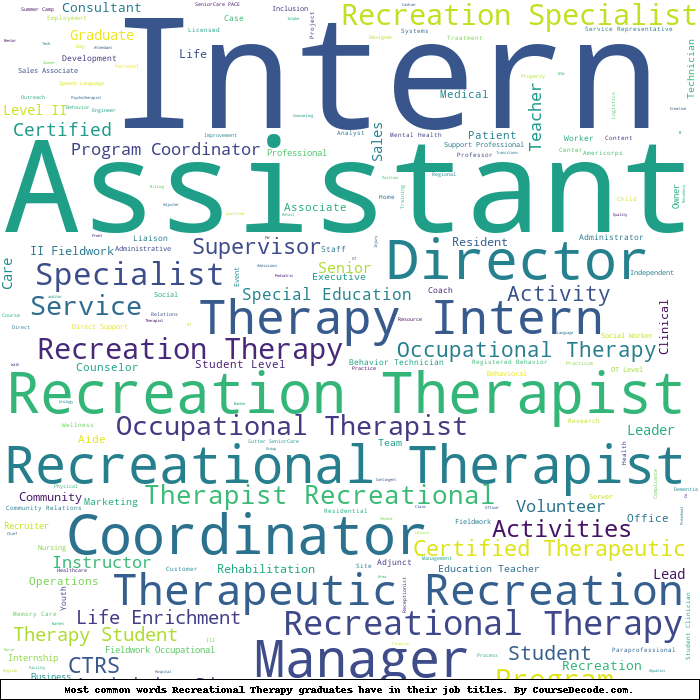
First, some facts. Of the Recreational Therapy graduates from Indiana University Bloomington we've analyzed , here's how many have used (or NOT used) their degree in their career:

These are estimates based on AI analysis of 11 LinkedIn profiles (see below).
The verdict? Significantly above average. Overall, with an average relevance score of 80%, Recreational Therapy graduates from Indiana University Bloomington have a much higher likelihood (+13%) of finding work in this field compared to the average graduate across all fields:
And for comparison, here's the chart for all profiles we've looked at across all degrees.
Also, after graduating, only 9% of these graduates have pursued further education other than another Bachelor's degree (such as a Masters degree or other), compared to the average across all profiles of 35%. This suggests a Bachelors degree is enough for most Recreational Therapy graduates, and it's normal to look for work straight after graduation.
See the details:
|
Relevance score: 69% We think this person has gone into a career only somewhat relevant to their degree. We think this person has gone into a career only somewhat relevant to their degree.
DEGREE INFOGraduated in 2017 from Indiana University Bloomington with a Bachelor's degree in Recreational Therapy. No other secondary education since. JOB HISTORY SINCE GRADUATIONTherapeutic Recreation Intern City of Boulder Parks and Recreation May 2017 - Sep 2017 Language and Culture Assistant  Ministerio de Educacin, Espaa Sep 2017 - Jun 2019 Life Enrichment Coordinator  HumanGood Oct 2019 - Jun 2020 Program Lead  Pomeroy Recreation & Rehabilitation Center Oct 2020 - Oct 2022 Dynamic Mindfulness Instructor  Niroga Institute Dec 2021 - Present Director of Program Development and Innovation  Le Tusa, Inc Oct 2021 - Present ABOUTMy passion and motivation are to help build a healthier, kinder, and more inclusive world for all people. I love helping and empowering those around me to live their best lives.I have a Bachelor's Degree in Recreational Therapy from Indiana University with minors in Spanish & Psychology. I have been a Certified Therapeutic Recreation Specialist (CTRS) for 5 years and am specially trained in modalities including mindfulness, movement, and dance. I'm blessed, grateful & excited to work with people of all abilities for the chance to connect, celebrate, share, learn, grow & play together, |
The top 10 most common jobs done by the graduates we've analyzed (ranked most common to least) are:
When analyzing the jobs held by graduates from the Recreational Therapy program at Indiana University Bloomington, it’s clear that there are a few common themes. Many have found roles as Recreational Therapists or in related positions, such as Program Specialists or Life Enrichment Coordinators, where they directly apply their education. Some of these roles, like those at various hospitals and rehabilitation centers, are very aligned with the principles of Recreational Therapy. Others, however, like jobs in marketing or event management, tend to drift away from the core focus of therapeutic practices. While the recreational knowledge gained from their degrees might be useful in those positions, they don't fully capitalize on the therapeutic skills that students hone throughout their studies.
Overall, graduates do tend to secure jobs that are often connected to the therapeutic side of recreation, especially in health and wellness settings. However, there's a noticeable mix of positions that veer into administrative, marketing, and management territories which may only skim the surface of the principles and practices taught in Recreational Therapy. So, while many folks are indeed using what they learned, there’s also a fair share that might not be leveraging their degree to its fullest extent. It definitely represents a mix of paths, some staying true to therapeutic recreation, while others branch out in different directions.
Here is a visual representation of the most common words in job titles for Recreational Therapy graduates (this is across all Recreational Therapy graduates we've analyzed, not just those who went to Indiana University Bloomington):

From analyzing the career paths of graduates with a Recreational Therapy degree from Indiana University Bloomington, it’s clear that many of them start off in roles closely tied to therapeutic recreation soon after graduation. Typically, their first jobs involve internships or entry-level positions like Recreational Therapy Interns or Activities Assistants, which help them gain practical experience and apply their academic knowledge. As they progress in their careers, typically within the first five years, many graduates evolve into more specialized roles such as Recreational Therapists or Program Coordinators in recreational or therapeutic settings. Some even take on managerial roles, like the Executive Director or Program Director positions, demonstrating a strong upward trajectory in the field.
However, the career paths vary significantly. While many have successfully integrated into roles relevant to their study area, some have branched out into non-traditional and sometimes unrelated fields, such as marketing, healthcare recruitment, or even working in the service industry. This suggests that while a degree in Recreational Therapy provides a solid foundation for a rewarding career in therapeutic settings, it also opens doors to various alternative pathways. Overall, most graduates appear to find fulfilling roles that utilize their skills in recreational therapy, especially as they gain experience over 5 to 10 years. It’s an encouraging sign for current students considering this career path, as there seems to be plenty of options and growth potential within and beyond traditional therapeutic roles.
Honestly, a Bachelor’s degree in Recreational Therapy is usually pretty manageable, especially at a school like Indiana University Bloomington. It’s got a balance of fun, engaging courses about leisure activities and therapeutic practices, mixed with some more serious stuff like psychology and health science. While it definitely has its challenging moments—like any degree does—most students find that the hands-on experiences and the opportunities to get involved in community activities make the learning feel really practical and relevant. So, if you’re passionate about helping people through recreation, you’ll probably find it more enjoyable than torturous!
Most commonly, in the LinkedIn profiles we've looked at, it takes people 4 years to finish a Bachelor degree in Recreational Therapy.
Looking at these Recreational Therapy graduates from Indiana University Bloomington, it seems like they've had some pretty varied career paths, but many of them aren't necessarily raking in the big bucks. Early jobs like internships and assistant positions typically pay on the lower side, and even moving up to roles like director or program manager, the salaries for these types of positions can range widely depending on the organization and location. The later positions, especially in management, might offer decent pay, but it's hard to say definitively without specific salary info. Overall, while some may be doing okay financially, it's clear that the road from graduation to a solid paycheck can be a bit of a grind in this field!
Here is a visual representation of the most common words seen in the "about" section of LinkedIn profiles who have a Bachelor degree in Recreational Therapy (this is across all Recreational Therapy graduates we've analyzed, not just those who went to Indiana University Bloomington). This may or may not be useful:

Here are all colleges offering a Bachelor degree in Recreational Therapy (ordered by the average relevance score of their Recreational Therapy graduates, best to worst) where we have analyzed at least 10 of their graduates:
| College | Score | Count |
|---|---|---|
 Indiana University Bloomington Indiana University Bloomington
|
80 | 11 |
 East Carolina University East Carolina University
|
75 | 13 |
 Florida International University Florida International University
|
69 | 12 |
 Central Michigan University Central Michigan University
|
61 | 10 |